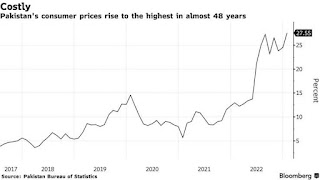Inflation has had a significant
impact on Pakistan's economy and society in recent years. High levels of
inflation have made it more difficult for individuals and households to afford
basic necessities, such as food and healthcare, and have reduced the purchasing
power of the Pakistani rupee.
Inflation has also contributed to social and political instability in Pakistan. High prices for essential
goods have led to protests and unrest in some parts of the country. The
government has had to implement price controls and subsidies to try to mitigate
the impact of inflation on low-income households, but these measures have been
difficult to sustain over the long term.
In addition, inflation has affected businesses and investors in Pakistan. High inflation reduces the
profitability of businesses, and can discourage investment in the country. This
can lead to a slowdown in economic growth and job creation.
The government and the State Bank
of Pakistan have implemented various policies and measures to try to manage
inflation, such as raising interest rates, tightening monetary policy, and
increasing the supply of essential goods. However, these measures have had
mixed success, and inflation remains a significant challenge for Pakistan's
economy and society.





No comments:
Post a Comment